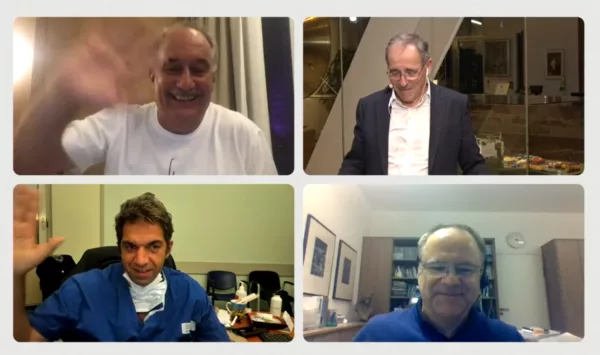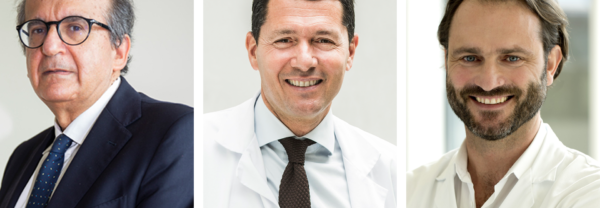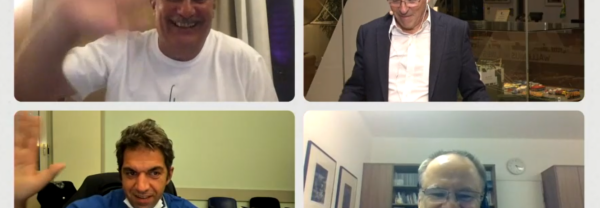ERUS-DRUS20: Meeting attracts new global audience
The EAU’s premier robotic urology event took place on November 6-7.
The EAU’s premier robotic urology event took place on November 6-7. Not in Düsseldorf as originally intended (and long hoped for), but as a two-day virtual event. The EAU Robotic Urology Section has years, if not decades, of experience with live transmissions of surgery from all across the world so it was well prepared for holding a virtual meeting. Close to 1200 participants registered to take part, turning the drawback of an online-only event into an advantage of reaching a much larger audience than usual.
ERUS Chairman Prof. Mottrie (Aalst, BE) welcomed viewers on Friday morning, kicking off two days with six live surgery sessions, covering 18 procedures. This year, ERUS co-organised the meeting with the German Society of Robotic Urology (DRUS), as a joint ERUS-DRUS20 meeting. Prof. Mottrie’s meeting co-organiser Prof. J.H. Witt (Gronau, DE) was one of the first surgeons to start his procedure at ERUS20, performing a full anatomical RARP with headset-based team communication.
Prof. Witt: “It was radical prostatectomy with complete anatomical preservation of the surrounding structures and it went quite well. We had some very interesting discussion on technique with moderators Profs. Rocco and Dasgupta, who also passed on questions from the audience.”
“It was pretty straightforward case. It demonstrated the headset team communication approach in the OR. Everyone is connected which makes communication process during surgery much easier.” Next to deploying the latest in communication technology, Witt also demonstrated the preparation of the prostate for intraoperatively frozen section and evaluation through confocal microscopy.
Other highlights of Friday include updates on robotic guidelines, a demonstration of a (nearly) sutureless technique for RAPN, and RARP after TURP (with confocal microscope). The sessions were a seamless mix of pre-recorded “as live” cases and live broadcasts from all across the world.
International participation
Saturday morning started with three plenary sessions organised jointly with the Asian Robotic Urology Society (ARUS), the Chinese Urological Association (CUA) and the Chinese Anti-Cancer Association Genitourinary Oncology Committee (CACA-GU). Taking advantage of the different time zones, the audience saw some procedures carried about robotically for indications that are more rare in Europe.
Prof. Mottrie: “Last year some of us went to the ARUS meeting and we were happy that they returned the favour by taking part in our meeting. We’re working closely together with our colleagues in Asia, they have fantastic robotic surgeons. We’re not only working together scientifically, but also when it comes to robotic education and training programmes.”
During the session, Prof. Mottrie pointed out that the audience was seeing procedures that are much more rare for European surgeons and are generally not performed robotically. “Radical nephrectomy with very large tumours and cavathrombus are more rare in Europe, probably due to more routine checks. In Asia, robotic techniques have been developed for these indications,” Mottrie explained.
Going virtual
Prof. Witt was understandably disappointed to not host the ERUS-DRUS20 meeting in Düsseldorf as initially conceived. “The ongoing pandemic situation forced us to postpone the Düsseldorf meeting to next year. For quite a while we were still hoping to have a regular meeting but about two months before it became clear that it would not be possible to host large groups of surgeons from all over Europe. Reimagining the scientific programme was a challenge but Prof. Mottrie and I worked closely together to make it possible with the help from the scientific committee and the congress organisers.”
Prof. Mottrie was pleased that an advanced virtual congress platform meant that while the meeting was shortened to two days, a lot of the sessions could still go ahead. ERUS-DRUS20 featured four virtual rooms, letting viewers choose which sessions they wanted to see. “Thanks to the platform, they can also always watch back what they initially missed.”
“It’s our first meeting with Edu4health, the developers of the congress platform. On the first day we had some minor technical difficulties but these were rapidly resolved. It’s a learning process for everyone involved. The quality of the live video streams were just about the best available.”
Collaborative meeting
ERUS-DRUS20 marks a joint, collaborative meeting between ERUS and its German equivalent. The scientific programme was composed with input from DRUS, and was expected to attract a lot of German delegates. With the change to a virtual meeting, and the postponement of the Düsseldorf meeting, this collaborative aspect was also postponed somewhat.
Prof. Witt: “In retrospective it’s difficult to say which topics were proposed by the German or the European colleagues, but the programme was developed with everyone’s involvement. Next year will also be an ERUS-DRUS meeting, so in fact it’s two years of combined meetings.”
Prof. Mottrie hailed the collaboration, pushing for even closer integration with DRUS. “Over the coming months we hope to achieve a very strong and more centralized collaboration. I think this will lead to quicker and more effective decision-making, if we speak with one voice. We see the ‘ERUS’ model works in Asia, in North America and it is my hope that ERUS and DRUS together can become one pan-European initiative.”



